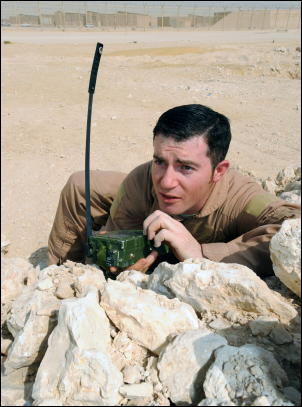SERE SPECIALISTS HELP AIR CREW RETURN WITH HONOR - Sgt. Eric Zwoll Calhoun Native
379th Air Expeditionary Wing
Public Affairs 379th Air Expeditionary Wing
Preparing for a mission, aircrew members listen carefully to the briefer as if their lives depend on his every word. If the mission goes awry, Staff Sgt. Eric Zwoll's survival, evasion, resistance and escape briefing may not only save their lives but allow them to return with honor.
Sergeant Zwoll, a native of Orma, Calhoun County WV, is one of a handful of SERE specialists here who support missions throughout the region by briefing theater preparation and SERE refreshers, planning and execution of reintegration operations, and serving as advocates for isolated personnel.
"In the U.S. Central Command theater, we don't actually train anybody," said Sergeant Zwoll.

Staff Sgt. Eric Zwoll, son of Edna Zwoll of Orma and the late Oliver Zwoll, Jr., is a survival, evasion, resistance, and escape
specialist with the Combined Air and Space Operations Center,
demonstrates the use of a PRC-112 survival radio here Tuesday. The
radio is used to contact recovery forces if a member of an aircrew
should become isolated in enemy territory. Sergeant Zwoll is native
to Orma, W. Va. and is deployed from Fairchild Air Force Base, Wash.
(U.S. Air Force Photo by Staff Sgt. Joshua Garcia)
The shop specialists here do not teach or instruct SERE as each service trains and prepares individuals before they arrive in theater, said Sergeant Zwoll, who is here on a permanent change of station from Fairchild Air Force Base, Wash., which is home for the Air Force's main SERE school.
"Our main responsibility is to directly assist and support personnel recovery operations," said Sergeant Zwoll. "We coordinate with all assets in theater to execute personnel recovery in the U.S. CENTCOM area of responsibility."
The SERE specialists support recovery as part of the Joint Personnel Recovery Center here. The JPRC prepares aircrew in U.S. CENTCOM to be recovered from an isolated situation and executes the recovery operations. SERE specialists do not run recovery operations but advise as subject matter experts.
"We focus on giving aircrew the information they need for the environments that they will be operating within," said Sergeant Zwoll.
The different environments within the AOR not only affect mission planning but recovery operations, said Sergeant Zwoll. Aircrew fl y in a wide range of environments to include not only desert, water, mountains, temperate plateau areas but also arctic conditions in the high altitude regions. Knowing theater-wide information allows SERE specialists to be knowledgeable advocates for not only aircrew, but anybody who may fi nd themselves isolated.
"We prepare individuals for what to do in case they fi nd themselves isolated. [We explain] how to survive in any environment and what actions they can take to help affect their own recovery," said the Orma, W. Va. Native. "If there is an event where we need to recover an individual, we put ourselves in their shoes. Knowing the type of training they have received and determining what they should be thinking and doing to survive."
Following a recovery operation, SERE specialists have a critical role in an individual's reintegration from isolation. Reintegration in this case has few similarities to when deployed servicemembers return to home station.
"We don't just recover the individual and say great to have you back, get back to work. That is not the focus," said Sergeant Zwoll. "Reintegration is geared toward taking care of this person throughout the full spectrum of their physical and psychological well being."
SERE specialists here focus efforts to expand reintegration into two more steps -- learn from the incident and use the information to prepare for future incidents, said Sergeant Zwoll.
SERE specialists see their job as helping aircrew ultimately return with honor.
"The point is to do what it takes to survive to the best of their ability. Give them the tools so they can do everything right and return with their honor intact and not do anything to the detriment of their country and fellow Airmen," said Senior Airman Brandon Dunphy, also deployed from Fairchild AFB.
Since its inception when the Air Force created SERE at the end of the Korean War, the training has evolved through its application in worldwide operations. There are always going to be lessons learned and modifi cations to the application of those lessons to prepare future operations, said Airman Dunphy, who was raised on Kadena Air Base, Okinawa.
"You have to push yourself to learn more and not be content with what you already know," said Airman Dunphy. The SERE specialist feels that with the mission and fellow Airmen's lives at stake, the status quo can never be accepted as already perfect.
"Today, the career fi eld has expanded because we have such a wealth of knowledge we have garnered from teaching, experiencing, and we are putting it into operational use here," said Sergeant Zwoll.